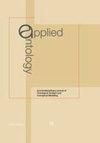AEON——一种自动评估本体的方法
IF 2.5
4区 计算机科学
Q3 COMPUTER SCIENCE, ARTIFICIAL INTELLIGENCE
引用次数: 47
摘要
OntoClean是一种对本体中分类关系进行形式化评估的方法。OntoClean的应用包括两个主要步骤。首先,概念根据元属性进行标记,即刚性、统一性、依赖性和同一性。其次,根据预定义的约束检查标记的概念,以发现分类错误。尽管OntoClean在许多出版物中都有很好的记录,但由于应用成本高,它仍然很少被使用。特别是,用正确的元属性手工标记概念需要经验丰富的本体工程师付出大量的努力。为了方便OntoClean的使用,并能够对现实世界的本体进行评估,我们提供了AEON工具,它可以自动标记具有适当OntoClean元属性的概念,并执行约束检查。我们使用Web作为世界知识的体现,在那里我们搜索指示如何正确标记概念的模式。我们根据手动创建的黄金标准彻底评估了我们的方法。评估显示了我们的方法的竞争力,同时显著降低了成本。我们所有的结果,即AEON工具和实验数据,都是公开的。本文章由计算机程序翻译,如有差异,请以英文原文为准。
AEON --An approach to the automatic evaluation of ontologies
OntoClean is an approach towards the formal evaluation of taxonomic relations in ontologies. The application of OntoClean consists of two main steps. First, concepts are tagged according to meta-properties known as rigidity, unity, dependency and identity. Second, the tagged concepts are checked according to predefined constraints to discover taxonomic errors. Although OntoClean is well documented in numerous publications, it is still used rather infrequently due to the high costs of application. Especially, the manual tagging of concepts with the correct meta-properties requires substantial efforts of highly experienced ontology engineers. In order to facilitate the use of OntoClean and to enable the evaluation of real-world ontologies, we provide AEON, a tool which automatically tags concepts with appropriate OntoClean meta-properties and performs the constraint checking. We use the Web as an embodiment of world knowledge, where we search for patterns that indicate how to properly tag concepts. We thoroughly evaluated our approach against a manually created gold standard. The evaluation shows the competitiveness of our approach while at the same time significantly lowering the costs. All of our results, i.e. the tool AEON as well as the experiment data, are publicly available.
求助全文
通过发布文献求助,成功后即可免费获取论文全文。
去求助
来源期刊

Applied Ontology
COMPUTER SCIENCE, ARTIFICIAL INTELLIGENCE-COMPUTER SCIENCE, INFORMATION SYSTEMS
CiteScore
4.80
自引率
30.00%
发文量
15
审稿时长
>12 weeks
期刊介绍:
Applied Ontology focuses on information content in its broadest sense. As the subtitle makes clear, two broad kinds of content-based research activities are envisioned: ontological analysis and conceptual modeling. The former includes any attempt to investigate the nature and structure of a domain of interest using rigorous philosophical or logical tools; the latter concerns the cognitive and linguistic structures we use to model the world, as well as the various analysis tools and methodologies we adopt for producing useful computational models, such as information systems schemes or knowledge structures. Applied Ontology is the first journal with explicit and exclusive focus on ontological analysis and conceptual modeling under an interdisciplinary view. It aims to establish a unique niche in the realm of scientific journals by carefully avoiding unnecessary duplication with discipline-oriented journals. For this reason, authors will be encouraged to use language that will be intelligible also to those outside their specific sector of expertise, and the review process will be tailored to this end. For example, authors of theoretical contributions will be encouraged to show the relevance of their theory for applications, while authors of more technological papers will be encouraged to show the relevance of a well-founded theoretical perspective. Moreover, the journal will publish papers focusing on representation languages or algorithms only where these address relevant content issues, whether at the level of practical application or of theoretical understanding. Similarly, it will publish descriptions of tools or implemented systems only where a contribution to the practice of ontological analysis and conceptual modeling is clearly established.
 求助内容:
求助内容: 应助结果提醒方式:
应助结果提醒方式:


